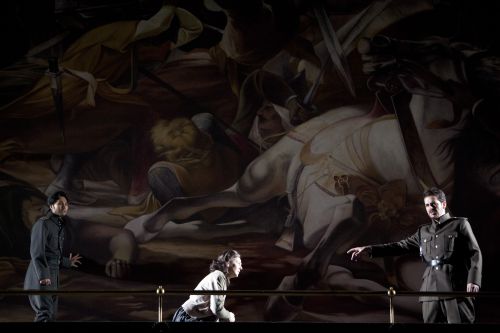Verdi: La Battaglia di Legnano, Philarmoniker Hamburg, Chor Staatsoper Hamburg, Simone Young (conductor), Staatsoper Hamburg 15.11.2013 (JMI).

Hamburg Opera
Cast:
Arrigo: Yonghoon Lee
Lida: Sara Galli
Rolando: Giorgio Caoduro
Barbarossa: Tigran Martirossian
Imelda: Rebecca Jo Loeb
Marcovaldo: Víctor Rud
Major: Szymon Kobylinski
New Production:
Direction: David Alden
Sets: Charles Edwards
Costumes: Brigitte Reuffenstuel
Lighting: Adam Silverman
La Battaglia di Legnano is a true rarity in the Verdi catalogue, both for its content and because there are few opportunities to see it on stage. After performances in Bilbao five years ago, it could be seen only in Italy, last year in Parma and Trieste and the year before in Rome.
It is the opera that puts an end to a genre that started with Nabucco and could be called “patriotic opera,” although I must say that the patriotic vein in this opera reaches levels well above those of any other work by Verdi. Its composition, following the Lombardy revolt against Austria in March 1848, is the contribution of the patriot Verdi, imbued with the spirit of Risorgimento, to the glory of his still evolving country. The premiere in January 1849 became a national event of the first magnitude and had to take place in Rome, the meeting place for Italian Republicans, rather than in Lombardy which was once again under Austrian rule. Whether due to the sincere patriotism of Verdi and his librettist Cammarano or to a certain amount of opportunism, you can count about thirty references to the not-yet-existent Italy and frequent cries of “Viva Italia” in the score.
From a purely musical point of view, the opera is rather uneven: in between war marches, we find pages of great beauty. I’m of the opinion that its patriotic origins and message are the main cause for its having fallen into oblivion.
As mentioned in an earlier review, the Verdi trilogy offered in Hamburg is due to David Alden and his team. The stage is largely the same as the one used in I Lombardi and consists of a space enclosed by a large gate and a kind of big elevated box from which the choir sings like a Greek chorus. Some props (beds and chairs) help to create the atmosphere in the different scenes. The action does not take place either in medieval days, as the libretto states, or in Risorgimento times, when the premiere of the opera took place, but in what appears to be some time around the Second World War. The stage direction is quite conventional, and placing the chorus in that box makes the stage movement less interesting than in I Lombardi.
The other protagonist of this trilogy is the music director of the Staatsoper, Simone Young, who offered a spirited and energetic reading, well suited to the opera’s characteristics. There was a solid performance from the orchestra and also from the excellent chorus.
Yonghoon Lee has achieved a position of some significance among today’s tenors. He had sung Arrigo in the production in Rome mentioned above, and here he was a very reliable performer. One could say that he is a tenor of the old school: a powerful voice, not very nuanced in his interpretation, and always living his role on stage. He was an excellent choice for the part.
It seems that in Hamburg there is a virus that affects sopranos: to the cancellation of Katja Pieweck in Ariadne the day before can be added that of Alexia Voulgaridou as Lida. It is not easy to find a worthy substitute for a character like Lida, and Hamburg decided to offer it to Sara Galli, who had sung Lida in Trieste in a second cast. Ms. Galli saved the performance, and the audience in Hamburg proved to be of an infinite kindness.
Baritone Giorgio Caoduro offered the best singing of the evening in the role of Rolando.His voice is attractive and well-pitched, and he sings with elegant line and significant doses of expressiveness. His biggest problem is that his high notes get a little thin.
Tigran Martirossian was a serviceable Barbarossa. Rebecca Jo Loeb was good as Imelda, while Viktor Rud was somewhat coarse as Marcovaldo.
The Staatsoper was almost sold out. At the final bows the biggest cheers were for Yonghoon Lee.
José Mª. Irurzun